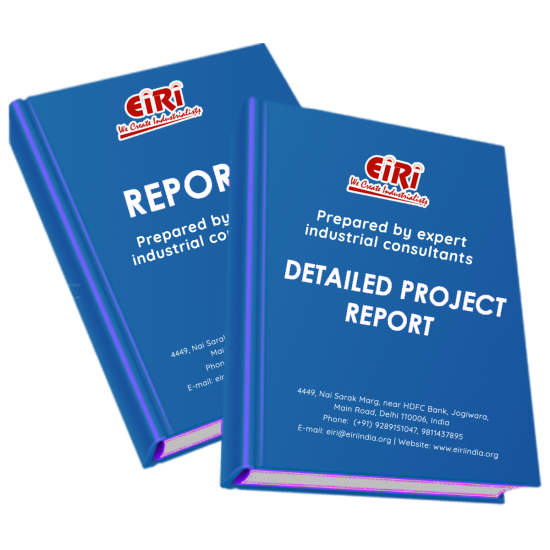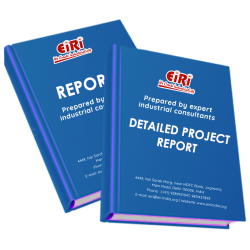Bio Coal from Waste (Capacity: 100 MT/Day)

- More than 40 years of experience
- Managed by expert industrial consultants
- ISO 9001-2015 Certified
- Registered under MSME, UAM No: DL01E0012000
- 24/5 Research Support
Get your quesries resolved from an industry expert. Ask your queries before report or book purchase. - Custom Research Service
Speak to the our consultant to design an exclusive study to serve your research needs. - Quality Assurance
All reports are prepared by highly qualified consultants & verified by a panel of experts. - Information Security
Your personal & confidential information is safe & secure.
BIO COAL FROM WASTE (CAPACITY: 100 MT/DAY)
[EIRI/EDPR/4541] J.C.: 2758XL
INTRODUCTION
Bio coal briquettes are one of the best alternatives to conventional coal. As we all know with an increased population it’s becoming more difficult to manage resources day by day. To understand the importance of bio coal briquettes let us first discuss the energy crisis.
In today’s world the energy crisis is the major concern. The limited natural resources that are used to power industrial society are diminishing as the demand rises. These natural resources such as conventional coal are in limited supply. While they do occur naturally, it can take thousands of years to replenish. Clearly demands are increasing but supply is limited! So we need to look for an alternative and that’s bio coal briquette. Demand for coal briquettes in the world is increasing day by day as it’s an eco-friendly option to choose.
India in October 2021 faced a power crisis due to the dwindling supply of coal which is the primary source of electricity generation. Coal reserves are critically low in 12 states. This was due to the heatwaves across the country. Moreover, the increasing demand of electrical devices has raised the need for more electricity generation. The unexpected demand for energy has once again brought the country’s coal shortage to the forefront. The coal shortage was largely blamed on low supply of coal from mines. As per the data from the Union Ministry of Coal, this year, the production by Coal India Ltd has increased by 23 percent, from Singareni Collieries Company Ltd by 34.2 percent and from captive mines by 40 percent. The major role of bio coal briquettes is to tackle the energy crisis. I know that most of you don’t feel connected to reality unless the price of gas goes up or there are lines at the gas station. So we should amidst that ongoing energy crisis is getting worse, despite many efforts. But in recent years, it is observed that there has been a huge push to move toward clean energy sources. No doubt those bio coal briquettes are one of them. This alternative to conventional coal is not only great for the environment, but they’re also safer to use and have lots of different benefits.
Bio coal briquettes are a biofuel substitute to coal and charcoal. They’re made from organic biomass. Briquettes are mostly used in the developing world, where cooking fuels are not as easily available. Also there has been a move to the use of briquettes in the developed world. Where they are used to heat industrial boilers in order to produce electricity from steam. The briquettes are co fired with coal in order to create the heat supplied to the boiler. Connect with our biogas consultants here.
Bio coal briquettes, mostly made of green waste and other organic materials, are commonly used for electricity generation, heat, and cooking fuel. These compressed compounds contain various organic materials, including rice husk, bagasse, ground nut shells, municipal solid waste, agricultural waste. The composition of the coal briquettes varies by area due to the availability of raw materials. The raw materials are gathered and compressed into briquette in order to burn longer and make transportation of the goods easier.
Bio-coal development is becoming important due to many factors including the rising cost of oil, natural gas and electricity and the scarcity of fossil fuels. The need to find alternatives to fossil fuels and reduce Greenhouse Gas emissions has prompted interest in Bio-coals by energy specialists around the world. Bio Coal Briquetting is the process of converting solid agricultural waste into high density and energy concentrated fuel briquettes. These Briquettes also called as White Coal are ready substitute of Coal/wood in industrial boiler and brick kiln for thermal application. Bio-Coal Briquetting plants are of various sizes which converts agricultural waste into solid fuels. Briquettes are ready substitute of Coal/wood in industrial boiler and brick kiln for thermal application. This development can significantly reduce greenhouse gases and heating costs and sustainably assist the development of rural communities.
Groundnut Shell is identified as ideal biomass for Bio-coal production due to low moisture contents, high net energy yield per hectare and low cost of production. These types of Shells are most favorably viewed, as it easily adapts to marginal soils and arid climates with minimal fertility and management requirements. Crushed Ground Nut Shells have a high Calorific value, hence, they are in most demand nowadays in the market. Ramit Bio-Coal (www.biocoalindia.com) having factories at Mumbai, Ahamadabad and Rajkot is specialized in making Bio-Coal from Ground Nut Shells. Bio-Coal made from Ground Nut Shells by Ramit Bio Coal is a viable energy option suitable for widespread application as it is energetically efficient, economical, convenient and user friendly.
COST ESTIMATION
Plant Capacity 100 MT/Day
Land & Building (10,000 sq.mt.) Rs. 5.55 Cr
Plant & Machinery Rs. 2.12 Cr
Working Capital for 1 Month Rs. 1.77 Cr
Total Capital Investment Rs. 10.35 Cr
Rate of Return 22%
Break Even Point 71%
CONTENTS
INTRODUCTION
BRIQUETTES ARE CHEAPER THAN COAL.
RAW MATETRIAL FOR BIO COAL BRIQUETTES
BIO COAL TECHNIQUE
PROPERTIES OF BIOCOAL
B.I.S. SPECIFICATION
DIFFERENCE BETWEEN COAL AND BRIQUETTE
DIFFERENE BETWEEN BRIQUETTE AND PELLETS
IMPORTANCE OF NAPIER GRASS AS COMPARE TO OTHER BIOMASS
OTHER THAN THIS BIO COAL BRIQUETTES USES IN VARIOUS
INDUSTRIES LIKE:-
ADVANTAGE OF BIO COAL
SALIENT FEATURE OF BIO COAL
TABLE: COMPARATIVE COST OF STEAM GENERATION
PROCESS FLOW DIAGRAM OF BIOCOAL
CALORIFIC VALUE OF RAW MATERIALS
COMPOSITION OF BIOMASS BRIQUETTESWITH OTHER FOSSIL FUEL
BIOMASS CO-FIRING FOR COAL POWER PLANT
COAL POWER PLANTS THAT SUCCESSFULLY CO-FIRED BIOMASS
SKEWED DEMAND-SUPPLY
GOVERNMENT INTERVENTION
BIOMASS ELECTRICITY
SPS BAKSHI, THE HEAD OF THE PLANT, SAID:
MARKET OVERVIEW OF BIO COAL
OPTION OF BIOMASS
1. RICE HUSK
2. SAW DUST
3. BAGASSE
4. GROUNDNUT SHELL
5. AGRICULTURAL WASTE
6. FOREST WASTE
7. WOOD BIOMASS
MARKETABILITY OF BIO COAL
BOILERS:
FURNACE & FOUNDRIES:
BRICK KILNS:
RESIDENTIAL & COMMERCIAL HEATING:
TRAINING AND VIABILITY
MARKET AND CONSUMERS
PRESENT MANUFACTURERS & EXPORTERS OF BIO COAL BRIQUETTES
COAL BRIQUETTES
MANUFACTURING PROCESS OB BIO COAL
PROCESS FLOW DIAGRAM
TESTING METHOD AND STANDARD
A) GCV (GROSS CALORIFIC VALUE):
B) MOISTURE CONTENT:
C) ASH CONTENT:
D) HGI (HARDGROVE GRINDABILITY INDEX):
E) FINES %:
PRINCIPLES OF PLANT LAYOUT
STORAGE LAYOUT:
EQUIPMENT LAYOUT:
SAFETY:
PLANT EXPANSION:
FLOOR SPACE:
UTILITIES SERVICING:
BUILDING:
MATERIAL-HANDLING EQUIPMENT:
RAILROADS AND ROADS:
MAJOR PROVISIONS IN ROAD PLANNING FOR MULTIPURPOSE SERVICE ARE:
PLANT LOCATION FACTORS
PRIMARY FACTORS
1. RAW-MATERIAL SUPPLY:
2. MARKETS:
3. POWER AND FUEL SUPPLY:
4. WATER SUPPLY:
5. CLIMATE:
SPECIFIC FACTORS
6. TRANSPORTATION:
A. AVAILABILITY OF VARIOUS SERVICES AND PROJECTED RATES
7. WASTE DISPOSAL:
8. LABOR:
9. REGULATORY LAWS:
10. TAXES:
11. SITE CHARACTERISTICS:
12. COMMUNITY FACTORS:
13. VULNERABILITY TO WARTIME ATTACK:
14. FLOOD AND FIRE CONTROL:
EXPLANATION OF TERMS USED IN THE PROJECT REPORT
1. DEPRECIATION:
2. FIXED ASSETS:
3. WORKING CAPITAL:
4. BREAK-EVEN POINT:
5. OTHER FIXED EXPENSES:
6. MARGIN MONEY:
7. TOTAL LOAD:
8. LAND AREA/MAN POWER RATIO:
PROJECT IMPLEMENTATION SCHEDULES
INTRODUCTION
PROJECT HANDLING
PROJECT SCHEDULING
PROJECT CONSTRUCTION SCHEDULE
TIME SCHEDULE
BIO COAL SUBSIDY
FOR BIO COAL SUBSIDING
SUPPLIERS OF PLANT AND EQUIPMENTS FOR BIO COAL BRIQUETTES
SUPPLIERS OF HAMMER MILLS
SUPPLIERS OF MATERIAL HANDLING EQUIPMENTS
SUPPLIERS OF RAW MATERIAL
SUPPLIERS OF RICE HUSK
SUPPLIERS OF SAW DUST
SUPPLIERS OF COCONUT SHELL
APPENDIX – A:
01. PLANT ECONOMICS
02. LAND & BUILDING
03. PLANT AND MACHINERY
04. OTHER FIXED ASSESTS
05. FIXED CAPITAL
06. RAW MATERIAL
07. SALARY AND WAGES
08. UTILITIES AND OVERHEADS
09. TOTAL WORKING CAPITAL
10. TOTAL CAPITAL INVESTMENT
11. COST OF PRODUCTION
12. TURN OVER/ANNUM
13. BREAK EVEN POINT
14. RESOURCES FOR FINANCE
15. INSTALMENT PAYABLE IN 5 YEARS
16. DEPRECIATION CHART FOR 5 YEARS
17. PROFIT ANALYSIS FOR 5 YEARS
18. PROJECTED BALANCE SHEET FOR (5 YEARS)
How to Make Project Report?
Detailed Project Report (DPR) includes Present Market Position and Expected Future Demand, Technology, Manufacturing Process, Investment Opportunity, Plant Economics and Project Financials. comprehensive analysis from industry covering detailed reporting and evaluates the position of the industry by providing insights to the SWOT analysis of the industry.
Each report include Plant Capacity, requirement of Land & Building, Plant & Machinery, Flow Sheet Diagram, Raw Materials detail with suppliers list, Total Capital Investment along with detailed calculation on Rate of Return, Break-Even Analysis and Profitability Analysis. The report also provides a birds eye view of the global industry with details on projected market size and then progresses to evaluate the industry in detail.
We can prepare detailed project report on any industry as per your requirement.
We can also modify the project capacity and project cost as per your requirement. If you are planning to start a business, contact us today.
Detailed Project Report (DPR) gives you access to decisive data such as:
- Market growth drivers
- Factors limiting market growth
- Current market trends
- Market structure
- Key highlights
Overview of key market forces propelling and restraining market growth:
- Up-to-date analyses of market trends and technological improvements
- Pin-point analyses of market competition dynamics to offer you a competitive edge major competitors
- An array of graphics, BEP analysis of major industry segments
- Detailed analyses of industry trends
- A well-defined technological growth with an impact-analysis
- A clear understanding of the competitive landscape and key product segments
Need Customized Project Report?
- Ask for FREE project related details with our consultant/industry expert.
- Share your specific research requirements for customized project report.
- Request for due diligence and consumer centric studies.
- Still haven't found what you're looking for? Speak to our Custom Research Team
About Engineers India Research Institute:
Note: We can also prepare project report on any subject based on your requirement and country. If you need, we can modify the project capacity and project cost based on your requirement.
Our Clients

Our Approach
- Our research reports comprehensively cover Indian markets (can be modified as per your country), present investigation, standpoint and gauge for a time of five years*.
- The market conjectures are produced on the premise of optional research and are cross-accepted through associations with the business players
- We use dependable wellsprings of data and databases. What's more, data from such sources is handled by us and incorporated into the report
Why buy EIRI reports?
- Our project reports include detailed analysis that help to get industry Present Market Position and Expected Future Demand.
- Offer real analysis driving variables for the business and most recent business sector patterns in the business
- This report comprehends the present status of the business by clarifying a complete SWOT examination and investigation of the interest supply circumstance
- Report gives investigation and top to bottom money related correlation of real players/competitors
- The report gives gauges of key parameters which foresees the business execution






















